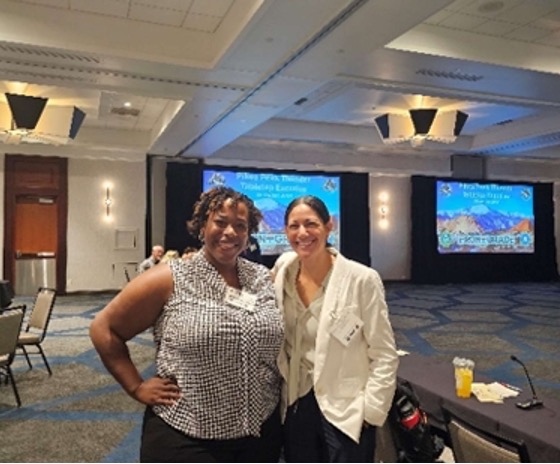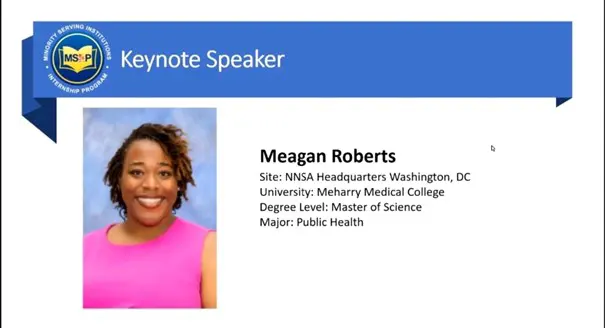NNSA-MSIIP fellow reflects on her experience in nuclear policy
Meet Meagan Roberts

Meagan Roberts, MPH, took the leap of faith to move to Washington, D.C., for her fellowship, leaving her with a lasting experience of growth and change. (Photo credit: Meagan Roberts)
In her last year of studying for her Master of Public Health (MPH) at Meharry Medical College, Meagan Roberts applied to the National Nuclear Security Administration (NNSA) Minority Serving Institutions Internship Program (NNSA-MSIIP). While her academic program heavily focused on the public health side, Meagan wanted to explore new avenues of public health at the intersection of nuclear security. Meagan was offered an opportunity to join NNSA’s Office of Nuclear Incident Policy and Cooperation (NIPC), focusing on nuclear incident response policy and capacity building for nuclear and radiological emergency preparedness.
The NNSA-MSIIP provides paid opportunities for undergraduate and graduate students at Minority Serving Institutions pursuing degrees in critical science, engineering, technology, mathematics and other disciplines that support the current and future missions of NNSA.
NIPC collaborates with domestic and international partners around the world to strengthen nuclear and radiological emergency preparedness and response capabilities and policy. NIPC’s mission is to develop policy and provide targeted emergency preparedness capacity building to counter and respond to radiological and nuclear incidents, accidents and terror threats – to help increase readiness to respond to any nuclear or radiological incident, regardless of the cause. This capacity building includes medical training for radiological injuries and consequence management training to take appropriate and effective actions that will save lives. Meagan’s appointment involved participating in meetings with multiple DOE offices and the interagency, engaging in existing capacity building engagements such as Silent Thunder table-top exercises and participating in the coordination, execution and observation of both virtual and in person trainings with multiple international partners. Additionally, Meagan was able to travel domestically for a few of these trainings and engagements on nuclear and radiological emergency preparedness and response. The overall purpose of her appointment was to learn about the office’s mission executed across three pillars: 1) policy and partnerships, 2) preparedness and operations and 3) exercises and interdiction training.
“My appointment allowed me to be in many different settings with diverse audiences, including other federal agencies, emergency services and first responders, law enforcement and other professionals,” she said. “It challenged me to learn and apply my own skills and put myself out there. I grew so much, learning about the nuclear security field, the mission of my office and emergency preparedness and the required tempo and elevated professionalism expected for the federal government.”
After Meagan was first notified of her selection, she had to decide whether to participate in-person or remotely and after speaking with her mentor and others, Meagan ultimately chose to move to Washington, D.C. While initially this brought fear, as Meagan had never really lived away from home for an extended period of time, this ultimately was the right decision and it opened new doors for Meagan and allowed for a fully immersive experience.
“Initially, I was worried and had imposter syndrome – I had no prior knowledge or experience within the field, so I was worried I wouldn’t be useful or find relevance to my field. However, the operations of my office had vast implications of a broader scale related to public health. My office made sure to expose me to nuclear security in a way for me to not only learn, but to apply my own knowledge and open my mind to actively engage and learn about how my expertise fit into the field of nuclear and radiological emergencies. I will never forget the opportunity to visit REAC/TS - the Radiation Emergency Assistance Center and Training Site and the medical management capabilities located there.” Upon reflection, Meagan explains that her experience allowed for great opportunity, personal and professional growth, exposure to and knowledge in new fields and achieving her goals.
Meagan at the Pikes Peak “Silent Thunder” Tabletop exercise with her mentor, Paloma Richard, JD. (Photo credit: Meagan Roberts)
The encouragement and support given to Meagan by her mentor and Director of NIPC, Paloma Richard, pushed her to step outside of her comfort zone, network with inspiring people and take advantage of the opportunities available. Through these conversations and meetings with remarkable individuals at DOE/NNSA, Meagan learned about their journeys and backgrounds, helping her realize different paths to success and cementing her own passion to make a significant public health impact and benefit through education or training.
“Once I changed my fears and pessimism into a positive attitude, I was able to be more confident in myself and in speaking and connecting with others in my network,” she said. “I no longer felt that my decision was a potential ‘mistake’ but rather a new opportunity to help me grow professional skills, be a mentor to others and seek advancement in my career aspirations and goals.”
Now, Meagan is a fellow within the Pacific Northwest National Laboratory (PNNL) NNSA Graduate Fellowship Program (NGFP), serving in NNSA’s Office of Strategic Partnerships and Engagements within the Office of Policy and Strategic Planning. Concurrently, Meagan is studying for her doctoral degree at Meharry Medical College, School of Global Health in Health Law, Policy and Management.
At the conclusion of her internship appointment, Meagan was selected as the keynote speaker to conclude the 2023-2024 MSIIP cohort. 
“Today, I would say without a doubt that my prior experience with ORISE and NNSA’s MSIIP program and my time at NIPC, helped me grow significantly into an authentic, responsible and endless-aspiring leader; whom I’d have never thought I could become if I hadn’t participated in the internship and had that experience.”
The NNSA-MSIIP Program is funded by NNSA and administered through the U.S. Department of Energy’s (DOE) Oak Ridge Institute for Science and Education (ORISE). ORISE is managed for DOE by ORAU.

